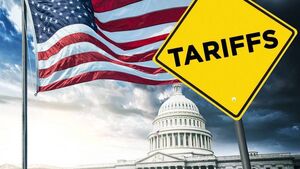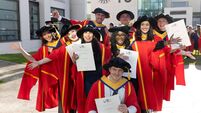Fr Liam Power: Need for a new moral vision in responding to Trump’s tariffs

Mr Trump's Executive applied a most egregious method to assess the tariff rates - it looked at the trade deficit between the US and a specific country as a percentage, and that was considered to be a tariff.
I’m not an economist, and I have no expertise in the very complex area of international trade. So it is with some trepidation that I attempt to comment on the announcement of sweeping tariffs on exports to the US from the EU and almost all other countries (except Russia) by the US president on Wednesday last.
Most commentators expressed outrage at the news because of the damaging consequences to local economies. But there was no serious discussion of a moral framework within which to evaluate and analyse the introduction of a policy that is predicted to have catastrophic consequences for nations worldwide, including Ireland.
Personally, I found it helpful to review this imposition of tariffs in light of Catholic Social Teaching.
At the outset, I acknowledge that the rationale provided for the introduction of tariffs was morally excoriated on a global level.
The tariffs were referred to as reciprocal in retaliation for tariffs that other countries have placed on American exports. It was claimed that other countries have unfairly advantaged their own industries at the expense of America’s, both through tariffs and through other methods, like special subsidies.
Mr Trump's Executive applied a most egregious method to assess the tariff rates - it looked at the trade deficit between the US and a specific country as a percentage, and that was considered to be a tariff. One example quoted was in relation to China whereby the value of US goods exported to China is 67% of the value of Chinese goods that are imported to the US. But “out of kindness” the president would only impose tariffs at half the rate of what other countries apply to the US. “We are being very kind,” he said.
He estimated that the EU imposes a 39% tariff on US exports. Consequently, a tariff of 20% will be imposed on EU exports (including Irish exports) to the US.
EU leaders have railed against this preposterous claim, which is blatantly false and thus unjust.
The US administration has included in the definition of trade restrictions issues such as food safety regulations that ban certain ingredients and vat (value-added tax), which funds social welfare programmes.
Commentators have pointed out that these restrictions apply to domestic goods, as well as foreign goods. Trump has offered to remove tariffs if Europe would remove these so-called trade barriers. But that would mean that Europe “would need to overhaul not only its trade practices but much of its tax and regulatory systems”.
If we broaden the moral framework in light of Catholic Social Teaching, it is obvious that there is a bankruptcy of social morality at the heart of this new policy on trade. The fundamental Gospel perspective that “from everyone who has been given much, much will be demanded” applies equally to world affairs as to individuals.
Christians would claim that the US, the most powerful nation in the world, is morally obliged to assist countries and peoples that are weaker and less fortunate” (Tablet Editorial). Thus it can be argued that an American First Agenda is bad theology.
Pope Francis in his magnificent encyclical “On Fraternity and Social Friendship”, emphasised our social responsibilities. He talks about building a more just and peaceful world through solidarity and universal brotherhood. This is the moral frame of reference in an era of globalisation.
The primary commandment to love God and your neighbour applies at the international level as well as at the interpersonal.
So applying this principle to international trade, Catholic Social Doctrine would view it as a means to promote the common good, which encompasses the well-being of all people, not just a select few.
Mr Trump’s policy risks precipitating a worldwide recession, which could result in huge job losses.
Also, Christians are called to solidarity with the most vulnerable, and this extends to international trade. With countries like Vietnam subjected to tariff rates of 46%, Thailand to rates of 36%, and Indonesia to 32%, it looks like the most vulnerable will be the most exploited.
This completely disregards the fundamental tenet of “the universal destination of goods”, that is, the insistence that the goods of creation are intended for the flourishing of the good of all humanity.
The Social Teaching of the Church consistently calls for robust international institutions, what Pope John called a “public authority with power”. Vatican II called for a “new International Order”, which would regulate international trade and outlaw the injustice caused by the inequality in power between trading nations.
A colleague, Brendan Hoban, has highlighted the moral bankruptcy of the current regime in the White House. There is a “glaring lack of a moral compass… and a complete absence of shame and honour”.
As the European Union reflects on how it should respond to outrageous breaches of existing trade agreements, it should engage in serious dialogue to create a new moral framework to shape or ground this response.






